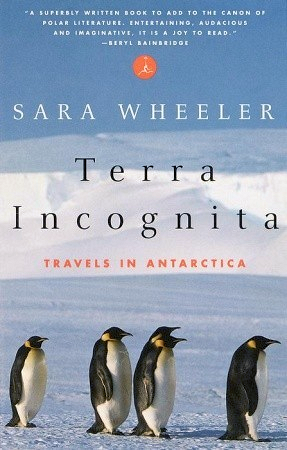 Anyone writing more than a simple account of a visit to Antarctica is faced with the problem of which aspects to cover — the narrative, descriptive, historical, scientific, political, and (for many) spiritual aspects of their experience. Sara Wheeler was lucky enough to spend several months in Antarctica, and her book sets out to cover most of these (although anyone looking for science, wildlife, or pictures will be disappointed!).
Anyone writing more than a simple account of a visit to Antarctica is faced with the problem of which aspects to cover — the narrative, descriptive, historical, scientific, political, and (for many) spiritual aspects of their experience. Sara Wheeler was lucky enough to spend several months in Antarctica, and her book sets out to cover most of these (although anyone looking for science, wildlife, or pictures will be disappointed!).
Despite what must be, I imagine, a strong temptation to try to describe the land- and sky-scapes of The Ice, and the impact they have on the writer, she is sparing with her descriptive passages. One of the longer descriptions is of the southern lights:
The sky was streaked with faint emerald shadows, splaying out in several directions to the horizon, changing shape, spreading, and bleeding into the blackness. Iridescent coppery beams roamed among the stars like searchlights, and soft ruby flames flickered gently above the glacier, sporadically leaping forward into the middle of the dark sky. Towards the east, a rich and luminous haze rolled lazily back and forwards like a tide. At one moment the whole sky was a rainbow, flaming with radiant mock suns.
Sara Wheeler’s historical research is exhaustive — she seems to have read just about everything ever written about Antarctica — and she weaves the history into her narrative. This is generally successful, but occasionally intrudes too much for the impatient reader who wants her to get on with the story! Her evaluation of the achievements of the “Heroic Era” of Antarctic exploration — and more recent exploits — is tinged with a healthy scepticism about the motivation of people whose primary motivation seems to be “to see how dead they can get”.
Antarctica clearly has a profound effect on many, if not most, of the people who spend time there, as the extensive quotations and extracts from historic and contemporary accounts show. Sara Wheeler does not shy away from describing the impact it has on her. She ends Chapter 5 on this note:
In Antarctica I experienced a certainty amid the morass of thoughts and emotions and intellectual preoccupations seething inside my balaclava’d head. … It wasn’t an answer … it was something that put everything else … in true perspective. … The landscape was intact, complete and larger than my imagination could grasp. … it was the scale, the unownedness, and the overpowering beauty that made Antarctica different. … I felt certain that a higher power exists … The glimpse left me with a deep and warm sense of calm and mental well-being, like the cosmic glow after some astronomical phenomenon.
She writes with humour, and a keen observation of character. Some of her thumb-nail descriptions are gems — I particularly liked the “sales rep from a computer company who attached himself to me for the whole journey [from Auckland to London]. He was wearing an Armani suit, and his face possessed none of those small wrinkles produced by thought.” Her description of life on the various bases she stays in gives a much better impression of the real day-to-day life of the scientists and support staff than the usual television documentary.
In fact her book is more about the people of Antarctica, past and present, than any other topic — the way they live now, the way they lived and died in the past, and how they respond to the physical and psychological challenges of this most extreme environment. There is a sense of today’s scientists carrying the baton of the great explorers of the past. Once you have become an Antarctican, it seems, you join a special group. As one of the New Zealand scientists says, “I hardly ever talk about Antarctica at home. No-one would understand.”
Overall verdict: What a year on The Ice is really like.
Vintage, 1997
